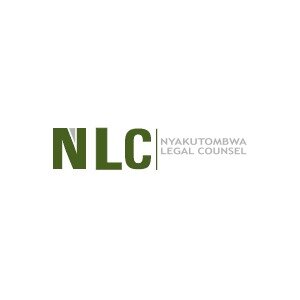Best Sustainable Finance Lawyers in Zimbabwe
Share your needs with us, get contacted by law firms.
Free. Takes 2 min.
Or refine your search by selecting a city:
List of the best lawyers in Zimbabwe
About Sustainable Finance Law in Zimbabwe
Sustainable Finance in Zimbabwe refers to financial practices and legal regulations that promote economic activities with positive environmental, social, and governance (ESG) impacts. The concept encourages businesses and investors to consider long-term societal and environmental benefits alongside financial returns. In Zimbabwe, Sustainable Finance is gaining attention as the nation faces environmental challenges such as climate change, resource depletion, and social inequality. Efforts are underway to align financial sector practices with international sustainability standards, while also supporting the country's specific developmental needs.
Why You May Need a Lawyer
Engaging a lawyer who specializes in Sustainable Finance can be crucial in several situations. Businesses and individuals may require legal guidance when raising green capital, issuing sustainability-linked bonds, or developing eco-friendly projects that seek funding. Legal help is often necessary to ensure compliance with evolving regulations, to draft or review funding agreements, or to navigate disputes involving environmental and social obligations. A lawyer can also assist with interpreting new policies, understanding incentives for sustainable investments, and structuring joint ventures with international partners in line with local law.
Local Laws Overview
Zimbabwe’s regulatory environment for Sustainable Finance is shaped by several laws and guidelines. The Reserve Bank of Zimbabwe and the Securities and Exchange Commission of Zimbabwe have both shown commitment to promoting sustainable financial practices. Key developments include the Green Bond Guidelines introduced in 2019, aimed at encouraging investment in projects with clear environmental benefits. The Environmental Management Act also plays a role by imposing obligations on businesses to mitigate environmental harm. Recent policies encourage financial institutions and issuers to disclose ESG risks and opportunities, in line with global trends. Businesses must also consider tax incentives for clean energy investments and local content requirements in project financing.
Frequently Asked Questions
What is Sustainable Finance?
Sustainable Finance integrates environmental, social, and governance (ESG) considerations into financial decision making. This approach seeks to support economic growth while aligning with sustainable development goals.
Which financial products are considered sustainable in Zimbabwe?
Green bonds, sustainability-linked loans, and investments in renewable energy projects are some examples of financial products classified as sustainable by Zimbabwean authorities.
Do banks in Zimbabwe offer specific services related to Sustainable Finance?
Some banks have started to develop green finance offerings such as preferential loans for solar energy and water management projects, guided by national and global sustainability principles.
Are there any incentives for businesses to engage in Sustainable Finance?
Yes, Zimbabwe provides tax incentives for investments in renewable energy and environmentally friendly projects. Businesses may also access international climate finance opportunities through approved channels.
How are sustainable finance projects regulated?
Projects are regulated through laws such as the Environmental Management Act and sector-specific policies introduced by financial regulators. Compliance with disclosure and reporting requirements is key.
Do foreign investors have to comply with local sustainability laws?
Yes, both local and foreign investors must adhere to Zimbabwe’s environmental and sustainability regulations when financing or developing projects in the country.
What is a green bond and can Zimbabwean companies issue them?
A green bond is a debt instrument specifically raised for environmentally beneficial projects. Zimbabwean companies can issue green bonds, subject to relevant guidelines and regulatory oversight.
What are the risks of ignoring Sustainable Finance regulations?
Non-compliance can result in penalties, loss of access to certain funding opportunities, or reputational damage for individuals and organizations.
How does Sustainable Finance relate to climate change action in Zimbabwe?
By directing investments towards green projects and technologies, Sustainable Finance supports Zimbabwe’s efforts to mitigate climate change and adapt to environmental challenges.
Where can I find qualified lawyers for Sustainable Finance matters?
Look for legal practitioners with expertise in financial law, environmental law, or experience advising on sustainable investment projects in Zimbabwe.
Additional Resources
You may find the following resources helpful: - The Reserve Bank of Zimbabwe - provides policy updates and regulatory guidance on Sustainable Finance - Securities and Exchange Commission of Zimbabwe - oversees capital market activities, including green bonds and ESG disclosures - The Environmental Management Agency - enforces environmental laws and regulations relevant to finance-linked projects - Zimbabwe Lawyers for Human Rights - may offer legal support related to social aspects of sustainability - Zimbabwe Environmental Law Association (ZELA) - advocates for environmental justice and can provide educational materials
Next Steps
If you require legal assistance in Sustainable Finance, start by identifying your specific issue, such as compliance advice, documentation for fundraising, or dispute resolution. Gather all relevant documents on your business or proposed project. Research and contact a lawyer or law firm with experience in Sustainable Finance, financial regulation, or environmental law. It is advisable to schedule a consultation to discuss your needs and understand your obligations and rights under Zimbabwean law. Stay updated with regulatory developments and maintain close communication with your legal advisor as Sustainable Finance continues to evolve in Zimbabwe.
Lawzana helps you find the best lawyers and law firms in Zimbabwe through a curated and pre-screened list of qualified legal professionals. Our platform offers rankings and detailed profiles of attorneys and law firms, allowing you to compare based on practice areas, including Sustainable Finance, experience, and client feedback.
Each profile includes a description of the firm's areas of practice, client reviews, team members and partners, year of establishment, spoken languages, office locations, contact information, social media presence, and any published articles or resources. Most firms on our platform speak English and are experienced in both local and international legal matters.
Get a quote from top-rated law firms in Zimbabwe — quickly, securely, and without unnecessary hassle.
Disclaimer:
The information provided on this page is for general informational purposes only and does not constitute legal advice. While we strive to ensure the accuracy and relevance of the content, legal information may change over time, and interpretations of the law can vary. You should always consult with a qualified legal professional for advice specific to your situation.
We disclaim all liability for actions taken or not taken based on the content of this page. If you believe any information is incorrect or outdated, please contact us, and we will review and update it where appropriate.
Browse sustainable finance law firms by city in Zimbabwe
Refine your search by selecting a city.

















